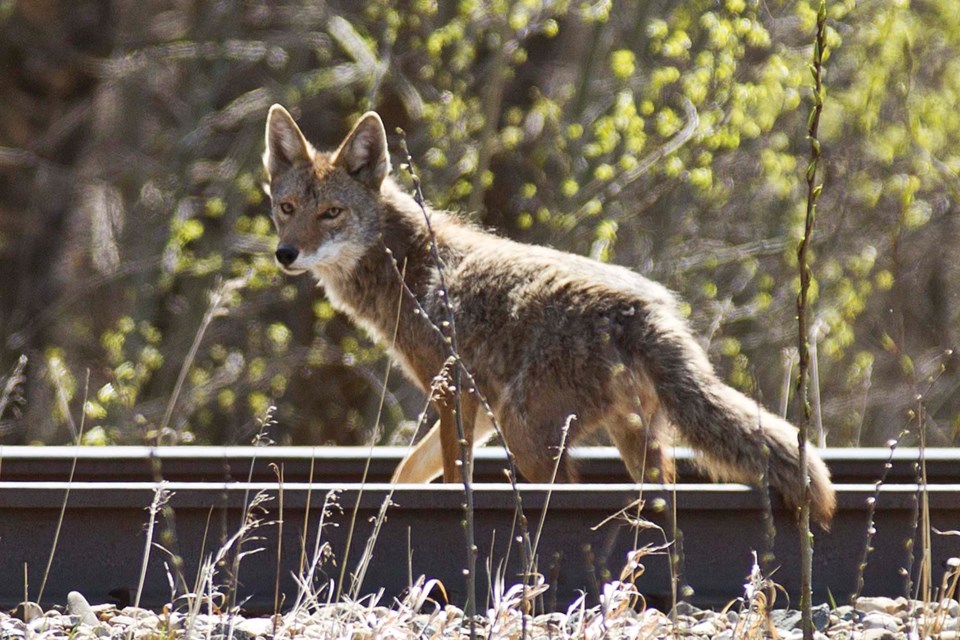A local dog trainer and a local veterinarian are warning the public to be aware of what their dogs are doing out in the fields after one animal died from a tapeworm likely contracted from coyote scat.
The culprit: Echinococcus multilocularis, a tapeworm that is endemic in the canine population in the province.
"It's very rampant in coyotes now. Up to 60 per cent of the coyotes actually carry that tapeworm in the wild. That's in the Edmonton and Calgary area," said Dr. Joel Watts, veterinarian at the Sturgeon Animal Hospital, noting that diagnoses are actually fairly rare.
"Basically, it has a cycle where there's a definitive host: coyotes or wolves, or dogs and cats. They have the tapeworm in their intestine; they don't usually get sick from it. They poop it out in the egg form and then things like mice, moose, and a couple other things will actually ingest it," he said.
"That's where humans come in as kind of an intermediate host, and that's where it forms the cysts and stuff in the liver and other organs."
While the animal owner was unavailable for comment, Watts said the dog in question was initially brought in for "non-specific symptoms," including vomiting and weakness. The owner first thought it might be related to heart trouble. It ended up being a cyst in its liver.
The owner had been treating the dog with a deworming pill, but it was specifically for roundworms, "the most common on that non-lethal kind of parasite," according to Kaytie Stack, proprietor of K9 Awareness in Riel Park.
The dog had been attending her facility. Though no other animals have become infected, she has increased measures to keep them safe.
"What we're increasing our protocol on now at the daycare and anybody coming in for classes [is owners have] to show us proof of a recent deworming with a broad protocol that covers all four different types of one parasite," she said, emphasizing that there can be human infections.
"This family has to go and get an ultrasound of their liver, each member of the family, to see where things are at, and then a follow-up later on. If there is any cyst present, then the prognosis is really grim," said Stack.
"The dog typically functions as the definitive host, similar to the coyote, where they basically pick it up and then the tapeworm lives in their intestine, but it actually rarely causes clinical signs," said Watts.
"Usually dogs are asymptomatic with this disease. You have the bigger risk, [which] is that you have an asymptomatic dog that's pooping out — potentially — eggs, and that's how humans get infected from their dogs."
Human incubation can be up to 15 years long, Watts said, adding that the problem might become less rare because of global warming, human encroachment on wild areas, and coyotes conversely becoming bolder about entering neighbourhoods.
When he was in veterinary school, the tapeworm was considered more of a problem around Calgary. It's definitely coming north, he said.
"Really, the biggest reason you're probably hearing about it now is that it's rare and it's very understudied. We only really learned about [the multilocularis] in the early 2010s."
The other thing that's weird about it is its incubation period — before you get clinical signs in humans — is up to 15 years long.
"The other thing, too, is that sometimes it's misdiagnosed as cancer in humans just because it forms these wicked cysts that when you look at them on the ultrasound, they do look like a tumor of sorts. But it is potentially becoming more prevalent, especially with the long incubation period, we might see it more commonly."
The most common way humans get infected from this Echinococcus is from contaminated produce or if their dog rolls around in poop and brings them into contact that way.
The best advice is to pay attention and keep your dog's health in check.
"It's basic stuff in the sense that if your dog is a big poop eater or rolls around in muddy areas or anywhere where coyotes might be, it’s a good idea to de-worm them regularly."
The.word to the wise for dog owners is that if they notice any sign of anything out of the ordinary for the dog, they had best get their dog seen by a veterinarian right away.
"Really, the biggest thing I worry about with this is the human aspect of it, just because again, dogs are pretty resilient to it, albeit they can get infected, but it's the fact that you have a dog that might be silently shedding it and again, very uncommonly, but if people do get it alveolar Echinococcus — so the one caused by the multilocularis — [it] requires lifelong treatment typically, and it's almost always fatal without treatment."




